(Disclaimer: I am not a scientist, but a storyteller who took way too many science classes in college. I apologize for the lack of scientific terminology presented here, but promise that if you read on, you may learn something...even if it is just what a strange person I am.)
The story of this epic battle begins a couple of years ago in my garden, where so many stories of struggle and hardship begin (notice the drama creeping in already!). Squashes, both winter and summer varieties, are one of my favorite plant families. I love the way they can and do grow anywhere, creeping up fences, under and through my bean plants or just straight across the yard with no concern for the lawn mower.
Not only do these beastly plants entertain with their size and tenacity, they often produce food by the bushel. Then there are the mutants! If you have never experimented with pollinating squash, it can be entertaining.
In order to ensure that the female flowers indeed turn into fruit, some gardeners play the role of bumble bee by rubbing a male flower all over the female flowers parts (don't worry, the article will remain family friendly, but may be a good starting point for those wondering how to have conversations about the birds and the bees). Often the squash have plenty of help, but this ensures pollination and if you save seeds it is essential.
Almost all squash will cross-pollinate, leaving you with seeds of questionable parentage (like my cat or Luke Skywalker). This is frustrating to the gardener who saves their seeds, only to end up with some strange, unidentifiable fruit (I'm sure this is how my parents feel about me). However, if your squash seeds end up in the compost, what fun it can be when they sprout up and produce a cross between a zucchini and a hubbard squash. Tasty? Not always. Interesting? You bet.
Up until a couple of years ago, I never had any major issues growing and harvesting squash. It seemed too easy. Even when the cool autumn nights would bring a dose of powdery mildew and destine them for the compost bin, I usually had already harvested plenty of fruit.
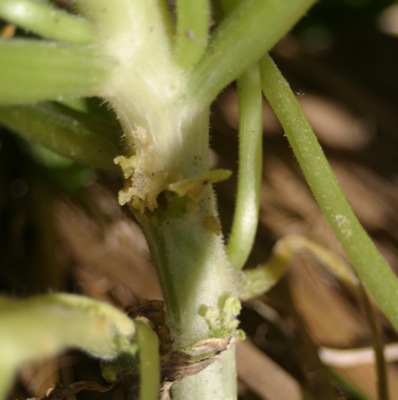 Damage from squash vine borers
Damage from squash vine borers
Then one dreadful summer, my plants wilted overnight. As a novice, or any gardener faced with a new challenge, I was not curious enough. I was too focused on weeds, watering, potato beetles, etc. I simply assumed that the plants were wilting due to the heat of summer, after all, that is what many large leafed plants do when the heat of the day sets in. Heck, thats what I do. When they did not recover the next morning, I finally began asking questions and started poking around the plants. My untrained eye did not see the massive damage happening inside the plants. Squash Vine Borers were at work.
The plants that year died, the unripe squash had no hope and I started to research what had happened. Foolishly, I had thrown the plants on the compost which probably allowed the worms to eat and then finish the life cycle, eventually burrowing back into the soil to pupate and overwinter.
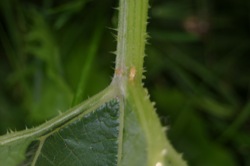 They often enter near the leaves
They often enter near the leaves
The next year, they came again. It was July and this time, the telltale wilt had me running at my plants, a crazy, pissed off gardener. If the neighbors thought I was goofy before, this surely confirmed it. I had grabbed a dental pick (bought at a bike shop to clean bike parts) and a knife and was running across the yard. Needless to say, my boy saw me and wanted to emulate his nutty pa. Oh well, there could be worse things he could copy.
I proceeded to dig out the little buggers. They are fairly easy to follow as they leave a trail of digested squash vine in little orange piles. The pick was great for rooting around in the vine with less impact than when I had to go in after them with the knife. When all was said and done, I was satisfied that I had found them all. I buried the cut vines where I could, watered them down and waited. All but one survived. However, the winter squash failed to produce more than just a couple fruit. The zucchini rebounded quite nicely.
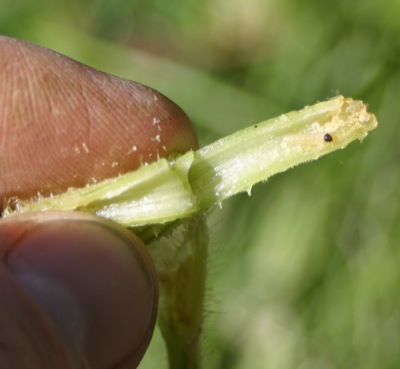 A small one, just hatched
A small one, just hatched
This year, blinded by optimism, the conquerer of the squash vine borer went crazy, planting 10 or 12 squash plants. Yes, it was going to be a banner year now that I had done away with those disagreeable and destructive pests. Surely they had learned their lesson (funny how "Mr. Optimist" checked his vines daily, looking for...victory?). Then it happened. One day, just about when I thought the neighborhood was beginning to see me as well adjusted and a danger to no one, they were there.
It was about the second week of July and they had descended. Not just a few here and there, but with major reinforcements. This time they were still mostly unhatched eggs, but certainly some of the fiends had already begun their vinaceous snacking. Again, there I am, sprinting to and from the shed, dental pick, knife and...camera. I'm not sure why, but I suppose if I was going to go insane, I wanted all to see the danger of planting squash.
I spent the next hour and a half laying in all manner of strange positions in my garden. If the next trend in yoga is "gardening yoga" I get some of the credit. It really was bizarre and intimate. There I was, in some sort of strange embrace with my six foot long squash vine picking out microscopic worms and their teeny eggs. If my wife was watching, I'm sure she was wondering why I don't give her that kind of attention...ummm...remember that shoulder rub I gave you a month ago honey?
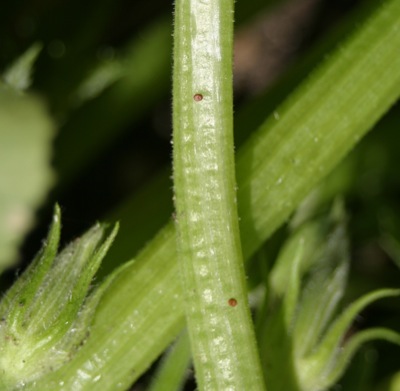 The eggs, quite hard and well adhered to vine
The eggs, quite hard and well adhered to vine
At some point during Operation Hot and Delusional I really was wishing that someone would take me away and lock me up. I was starting to obsess, but once a battle is waged, it gains momentum and I simply could not stop until I was fairly sure that I had eliminated the problem.
I quickly learned that the eggs have a fairly hard shell and since there were probably 20-30 eggs per plant it seemed impractical to squish each one. I was simply scraping them off, hoping that would damage them or that the little buggers would not be able to find their way back to the plant.
The operation seemed to be a success. Although I ended up removing 15-20 of the more damaged leaves which shocked the plants a bit, they did not have the telltale wilt that always comes with a vine borer at work within a plant. I thought about having a ticker tape parade to celebrate, a kind of in-your-face celebration of my grit, determination and will. Good thing I don't have any readily available parade floats because a week later, I noticed a second coming of eggs, some of which had already hatched. I had read that this could happen, but was rare. Lucky me.
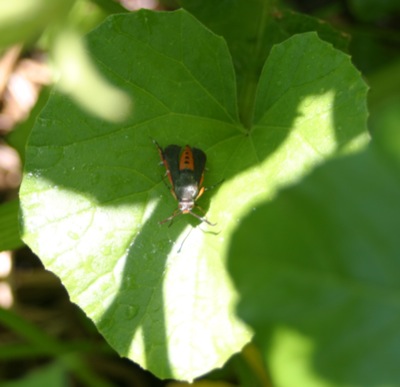 The adult moth, looks like a wasp in flight
The adult moth, looks like a wasp in flight
I tried to go at it again, but this time it was more about anger and the fight than it was about saving my beloved plants. This is a very subtle but important difference that we often miss in the heat of battle. Most of us, in hindsight, can probably identify a tipping point in our daily battles, whether they are about personal arguments, familial pride, an angry neighbor, or perhaps a garden pest.
The problem is that we are usually not terribly self-aware when engaged in a fight. The point when we could safely stop passes us by and we find ourselves fighting only because we don't like to lose. It is no longer about the original reason for the fight, which may have been quite worthwhile and deserving of our energy. No, just like with these damnable bugs, at some point you have to stop and look at yourself from outside of yourself. You must ask what the fight is about and whether it is worth it. For me, I gave it one final push, one last assault and at that point, I let it go. Whatever will be, will be. I can always buy squash at the farmers market and if time is money, it will be worth it.
In closing, let me say that I am glad that I did put up a fight, rather than just giving up. By taking action and being curious, I learned a ton about squash and their pests, including the fact that certain varieties are more resistant to squash vine borers. Some folks place mesh over their plants to block the moth. Others claim that if you till your soil fairly deeply, it can disrupt the pupation stage. I also learned, once again, the value of what farmers do and how difficult their task really is.
However, the more important lesson I learned is about how we choose our battles. Already, I have applied this to my daily life. I am slowly discovering that this type of personal growth and learning is what happens when you are passionate about something and strive to master it...and yes, at times it does seem like insanity. Embrace it and fight for what you love...and if you are losing the battle, sometimes it is best to just let it go.

Lawrence Black is a writer and editor at Simple, Good and Tasty. He can be reached at lawrence@simplegoodandtasty.com.




